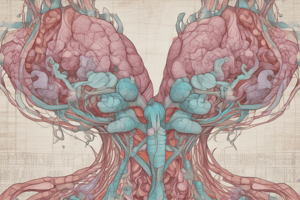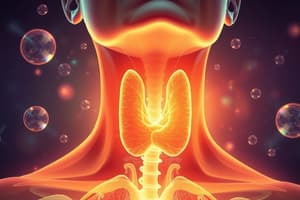Podcast
Questions and Answers
How can hyperthyroidism impact sexual functioning and desire?
How can hyperthyroidism impact sexual functioning and desire?
- Enhanced sexual performance
- Increased libido
- Unaffected libido
- Decreased libido (correct)
What symptoms might women with hyperthyroidism experience related to their menstrual cycles?
What symptoms might women with hyperthyroidism experience related to their menstrual cycles?
- Improved mood swings during menstruation
- Decreased libido
- Lighter, heavier, or irregular menstrual cycles (correct)
- Increased fertility
Which symptom of hyperthyroidism is related to changes in skin texture?
Which symptom of hyperthyroidism is related to changes in skin texture?
- Darkening of the skin
- Increased skin hydration
- Dryness and thinning of the skin (correct)
- Thickening of the skin
What effect can hyperthyroidism have on vision?
What effect can hyperthyroidism have on vision?
Why is it important for individuals suspecting hyperthyroidism to consult a healthcare provider?
Why is it important for individuals suspecting hyperthyroidism to consult a healthcare provider?
Which of the following is NOT a common symptom of hyperthyroidism?
Which of the following is NOT a common symptom of hyperthyroidism?
A person with hyperthyroidism may experience which of the following digestive issues?
A person with hyperthyroidism may experience which of the following digestive issues?
What is the likely cause of weight loss in individuals with hyperthyroidism?
What is the likely cause of weight loss in individuals with hyperthyroidism?
Which of the following is NOT a common symptom of hyperthyroidism mentioned in the text?
Which of the following is NOT a common symptom of hyperthyroidism mentioned in the text?
Which symptom is directly related to the effect of hyperthyroidism on the cardiovascular system?
Which symptom is directly related to the effect of hyperthyroidism on the cardiovascular system?
Study Notes
Symptoms of Hyperthyroidism
Understanding Hyperthyroidism
Hyperthyroidism is a condition where the thyroid gland produces an excessive amount of thyroid hormones, particularly triiodothyronine (T3) and thyroxine (T4), leading to accelerated metabolic processes throughout the body. The thyroid gland, located in the front of the neck, regulates various bodily functions such as metabolism, growth, and development. An overactive thyroid can lead to a range of both subtle and noticeable symptoms.
Common Symptoms
Hyperthyroidism symptoms vary depending on the intensity of the hormonal imbalance and can mimic other conditions. Some common symptoms include:
- Weight loss despite normal appetite: Rapid weight loss can occur due to increased energy expenditure and decreased appetite caused by the excess hormones.
- Heat intolerance: People with hyperthyroidism may have difficulty managing their body temperature, experiencing feelings of warmth or sweating more frequently.
- Increased heart rate: Heart palpitations and a racing heartbeat are common symptoms of hyperthyroidism, due to the increased metabolic demands on the cardiovascular system.
- Anxiety or irritability: Hyperthyroidism can increase nervous energy, resulting in anxiety, agitation, or mood changes.
- Digestive issues: Frequent bowel movements, diarrhea, or bloating can occur due to the rapid metabolic processes affecting the gastrointestinal tract.
- Muscle weakness or tremors: Muscular weakness or fine muscle trembling, especially in the hands or fingers, can be experienced due to the accelerated metabolism and nutrient utilization.
- Fatigue: Although people with hyperthyroidism may feel temporarily energized, prolonged periods of untreated hypothyroidism can lead to exhaustion and fatigue.
- Menstrual irregularities: In women, menstrual cycles may become lighter, heavier, or irregular due to the disruption of hormonal regulation.
These symptoms can sometimes be mistaken for stress, anxiety, or other health issues, making it essential to consult a healthcare professional if any of them persist for an extended period.
Subtle Symptoms
Some hyperthyroidism symptoms might go unnoticed, requiring medical attention for proper identification. These may include:
- Changes in skin texture: Dryness, thinning, or increased sensitivity may occur, affecting the skin's appearance and elasticity.
- Swelling: Hyperthyroidism can lead to swollen hands or feet due to fluid retention caused by accelerated metabolism.
- Impaired vision: As hyperthyroidism affects various body functions, visual disturbances such as blurriness or eye strain may occur due to changes in eye muscles or reflexes.
- Changes in libido: Hyperthyroidism can affect sexual functioning and desire, leading to altered interest or performance issues.
If you suspect you might have hyperthyroidism, consult your healthcare provider for proper diagnosis and treatment options. Early identification and management can help alleviate symptoms and prevent potential complications associated with untreated thyroid hormone imbalances.
Studying That Suits You
Use AI to generate personalized quizzes and flashcards to suit your learning preferences.
Description
Test your knowledge on the symptoms of hyperthyroidism, a condition caused by excessive thyroid hormones affecting various bodily functions. Learn about common and subtle symptoms associated with an overactive thyroid gland and how to differentiate them from other health issues. Be prepared to identify signs of hyperthyroidism for early diagnosis and treatment options.




